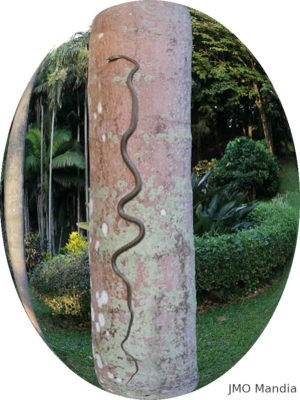– Rev José Mario O Mandía
When we talk about creation and God’s goodness, we inevitably come across the problem of evil. Why is there evil? Where did it come from?
First of all, what do we mean by “evil”? Many people construe evil as some “thing.” Saint Thomas says, however, that “evil is the absence of the good which is natural and due to a thing” (S Th I q49 a1). It is not the presence of some “thing,” but the absence of something (a good). Moreover, this missing good is required by the thing (“due to a thing”). If it is not required by the thing, it is not considered an evil.
Let us give an example. The sense of sight is a good. It is a good that animals and men need to have. On the other hand, plants do not need it. To be deprived of the sense of sight (blindness) is an evil for animals and men because it is part of their nature to see. But blindness is not considered an evil for plants, because the nature of plants do not require the sense of sight.
If evil is the absence of something, does that mean evil is not real? Not at all. We can illustrate this with the following analogy. If we take a sheet of paper, and cut a hole in the middle using a pair of scissors, what do we have? A hole. Is there something in the hole? Nothing. But is the hole real? Yes. There is really a hole. The hole is the absence of something that ought to be there (paper). This kind of absence is called a privation. Evil is a privation.
In Bite-Size Philosophy (no 31), we have seen that good and being are the same thing in reality. Hence, the absence of good is the absence of being. Now, when God creates, He creates being: He creates the good. Thus, he does not create evil.
A corollary of the above (evil is the absence of being) is that evil cannot exist by itself. It exists in a being that is lacking something. Sickness exists in an organism that lacks health. Ignorance exists in a mind that lacks knowledge. Error exists in a person who lacks information. Hatred exists in one who lacks love. Sickness, ignorance, error, hatred do not exist by themselves.
One might object: How about cockroaches? And earthquakes? And the devil?
These questions require us to distinguish between physical evil and moral evil (sin).
Regarding physical evil, an initial answer to the question of why it exists is given by the CCC (no 302). “Creation has its own goodness and proper perfection, but it did not spring forth complete from the hands of the Creator. The universe was created ‘in a state of journeying’ (in statu viae) toward an ultimate perfection yet to be attained, to which God has destined it. We call ‘divine providence’ the dispositions by which God guides his creation toward this perfection”
This is also why God tasked our first parents and all humankind with the task of tilling and keeping the garden of Paradise (Genesis 2:15). Our task is to make it more perfect than when we found it.
CCC 310 repeats the question: “But why did God not create a world so perfect that no evil could exist in it? With infinite power God could always create something better. But with infinite wisdom and goodness God freely willed to create a world ‘in a state of journeying’ towards its ultimate perfection. In God’s plan this process of becoming involves the appearance of certain beings and the disappearance of others, the existence of the more perfect alongside the less perfect, both constructive and destructive forces of nature. With physical good there exists also physical evil as long as creation has not reached perfection.”


 Follow
Follow


